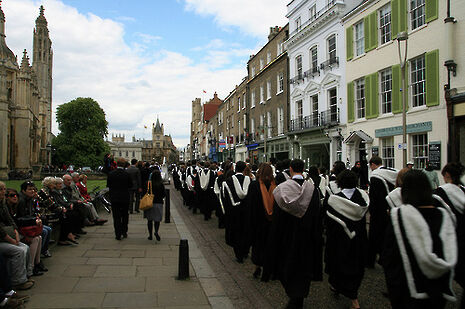Buying a place at Oxbridge
Joanna Tang considers whether “university places for the rich” is really as bad as it sounds

Tuition fees are a sensitive political subject during these turbulent days. So a knee-jerk reflex to a headline such as "Rich to buy top university places" is understandable, if too basic.
If there was a modicum of this blunt meaning in Universities Minister David Willetts' original ominous "innovative ideas about how you could liberalise the system", "for extra people to get to university," the ready explosion has made it more than clear that that modicum is dead. Or at least, very, very unpopular.
It is surprising that Willetts could not have thought twice before stepping on that landmine - the most polemical weapon that the Conservatives' political opponents can brandish at them.
If we do not simply stop at the idea that university places will now be intended as commercial toy for the rich, we can consider the idea for what it is practically. And it seems to me that it is defensible.
What repulses people is the idea that people who are lazier – but richer – will be allowed to enter universities and mix with the rest of us gifted, studious beings. But if entrance requirements to universities are unaffected – if the students the extra places go to would have been given a place anyway – when these people could fund themselves, why should public money be spent on them?
Public money should and could be spent on students from disadvantaged backgrounds. The university sets aside an extra place for a self-funded student. If this student was bright enough to have got in anyway, this frees up a place within the publicly-funded quota, which could go to a student from any background, underprivileged or over-privileged.
Mr. Willetts later said that the extra places would not be funded by wealthy individuals, but by employers and charities. At Cambridge, there is a system already in place for bursaries funded by charities and industrial sponsorship grants.
As MPs pointed out, there are clearly ways to exploit such a system, such as if wealthy families set up trust funds for their children. So what remains is to see if the government can cope with regulating the system to ensure fairness.
Universities are one of the few spots left where advantage from privilege has not squeezed its way in, the shrine of social mobility and the point at which previous inequalities are erased. If it was not for the British university system, I would not be setting foot in the same place as someone who went to Eton. After this, it won't matter, because we will both have gone to Cambridge.
When the entire foundation stone of what you are born with versus what you earn for yourself is at stake, I can't really blame people for treating public-school millionaires like David Willetts and David Cameron with suspicion. But overly defensive reflexes to sensationalism must be avoided if we are to consider this proposal rationally.
 News / CUP announces funding scheme for under-represented academics19 December 2025
News / CUP announces funding scheme for under-represented academics19 December 2025 News / SU reluctantly registers controversial women’s soc18 December 2025
News / SU reluctantly registers controversial women’s soc18 December 2025 News / Cambridge welcomes UK rejoining the Erasmus scheme20 December 2025
News / Cambridge welcomes UK rejoining the Erasmus scheme20 December 2025 Features / Should I stay or should I go? Cambridge students and alumni reflect on how their memories stay with them15 December 2025
Features / Should I stay or should I go? Cambridge students and alumni reflect on how their memories stay with them15 December 2025 Film & TV / Timothée Chalamet and the era-fication of film marketing21 December 2025
Film & TV / Timothée Chalamet and the era-fication of film marketing21 December 2025









